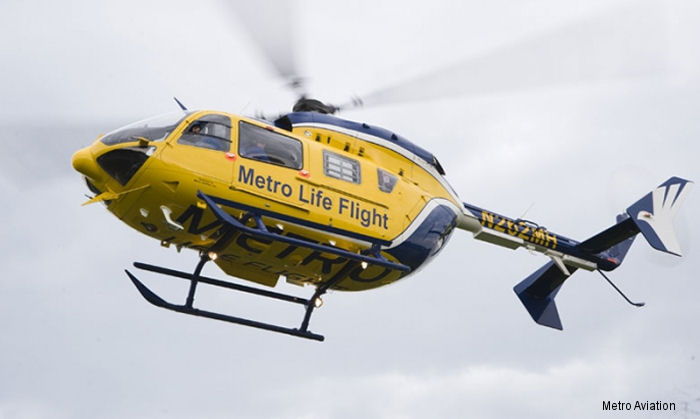
MetroHealth, August 04, 2014 - The MetroHealth System is part of a study called Prehospital Air Medical Plasma Trial (PAMPer). Individuals experiencing hemorrhagic shock (uncontrolled bleeding) will be given two units of plasma while in the helicopter on the way to the hospital by Metro Life Flight.
People in this study will be unable to give informed consent because they will be experiencing life-threatening bleeding and shock, and the treatment must be started immediately in the helicopter on the way to the trauma center. This study will be conducted under the FDA exception-from-informed consent process. Before starting the study, MetroHealth educated the public about the upcoming research, which includes community consultation and public notification.
This research will look to see if there is a benefit to delivering treatment that is normally given in the hospital at an earlier time, while in air transport. MetroHealth and its partners will look at what happens to people who are given plasma on the way to the hospital and study their clinical outcomes including:
Will bleeding stop earlier
Will people require less blood to be given
Will people have less serious medical problems
Will people get less infections in the hospital
Will there be a lower incidence of Acute Lung Injury and transfusion related to Acute Lung Injury.
"This study is taking standard of care and making it happen sooner." said Jeffrey Claridge, MD, Director of Trauma, Critical Care and Burns at MetroHealth.
Metro Life Flight will enroll research participants with blunt or penetrating trauma and hemorrhagic shock who are being transported to MetroHealth Medical Center. Metro Life Flight already carries red blood cells for transfusion in these individuals. Plasma will be given to individuals as part of this research study. Plasma has not been available in the helicopter before, because there are many logistical issues related to coordinating between helicopters and the blood bank. For example, plasma is stored in a freezer and it takes time to thaw the plasma before giving it to people. This is difficult to do when in an emergency situation.
If MetroHealth and its partners discover through their research that giving plasma on the way to the hospital helps injured people, we can improve the way emergency services use plasma nationwide.
"We were approached to be part of this very high-level study," Dr. Claridge told The Plain Dealer. "Metro is a fantastic trauma hospital and the fact that we're part of a Department of Defense study is an incredible thing for Cleveland and Northeast Ohio."
The study will be conducted over four years. Patients must be 18 – 90 years old with low blood pressure or bleeding that does not get better with standard treatment.
Community members who do not wish to participate in this research study can obtain a bracelet to opt out. Please visit www.metrohealth.org/pamper for more information
People in this study will be unable to give informed consent because they will be experiencing life-threatening bleeding and shock, and the treatment must be started immediately in the helicopter on the way to the trauma center. This study will be conducted under the FDA exception-from-informed consent process. Before starting the study, MetroHealth educated the public about the upcoming research, which includes community consultation and public notification.
This research will look to see if there is a benefit to delivering treatment that is normally given in the hospital at an earlier time, while in air transport. MetroHealth and its partners will look at what happens to people who are given plasma on the way to the hospital and study their clinical outcomes including:
"This study is taking standard of care and making it happen sooner." said Jeffrey Claridge, MD, Director of Trauma, Critical Care and Burns at MetroHealth.
Metro Life Flight will enroll research participants with blunt or penetrating trauma and hemorrhagic shock who are being transported to MetroHealth Medical Center. Metro Life Flight already carries red blood cells for transfusion in these individuals. Plasma will be given to individuals as part of this research study. Plasma has not been available in the helicopter before, because there are many logistical issues related to coordinating between helicopters and the blood bank. For example, plasma is stored in a freezer and it takes time to thaw the plasma before giving it to people. This is difficult to do when in an emergency situation.
If MetroHealth and its partners discover through their research that giving plasma on the way to the hospital helps injured people, we can improve the way emergency services use plasma nationwide.
"We were approached to be part of this very high-level study," Dr. Claridge told The Plain Dealer. "Metro is a fantastic trauma hospital and the fact that we're part of a Department of Defense study is an incredible thing for Cleveland and Northeast Ohio."
The study will be conducted over four years. Patients must be 18 – 90 years old with low blood pressure or bleeding that does not get better with standard treatment.
Community members who do not wish to participate in this research study can obtain a bracelet to opt out. Please visit www.metrohealth.org/pamper for more information
See also |
25th CAB Boost Patient Outcomes with Blood Products
Vanderbilt to Study Use of Plasma on LifeFlight
GNAAS to carry life-saving blood




